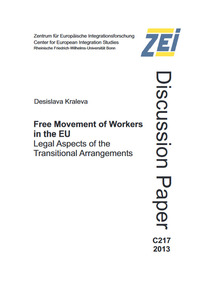Free movement of workers in the EUlegal aspects of the transitional arrangements

Free movement of workers in the EU
legal aspects of the transitional arrangements

| dc.contributor.author | Kraleva, Desislava | |
| dc.date.accessioned | 2022-06-27T08:52:44Z | |
| dc.date.available | 2022-06-27T08:52:44Z | |
| dc.date.issued | 2013 | |
| dc.identifier.uri | https://hdl.handle.net/20.500.11811/9953 | |
| dc.description.abstract | There are four fundamental freedoms which lay the foundation of the European Union. Those are the free movement of goods, free movement of capital, free movement of services and free movement of persons. They guarantee the existence and effective functioning of an area without internal borders within which goods, capital, services and people move freely. Despite the pivotal importance of these freedoms, there are cases where some freedoms can be partially or fully restricted within the territory of some member states or the Union as a whole. This thesis is going to analyze the restrictions of one of these freedoms: the free movement of persons, resulting from the arrangements applying to new member states. The focus will be the free movement of workers from new to old member states for a transitional period following the date of accession.
Theoretically, the transitional arrangements are flexible provisions which offer two-way protection, to both old and new member states. Despite the fact that they are imposed by the old members and their economic justification is questionable, they also protect the vital interests of new member states. Particular instruments for this protection are the standstill and safeguard clauses. The standstill clause guarantees that old member states will not apply to new member states stricter regimes than the ones in force at the date of signing of the accession treaties. Thus, the standstill clause protects new members guaranteeing them a minimum standard of treatment. The safeguard clause envisages the opportunity for old member states which remove the restrictions before the end of the transitional period to reintroduce them, if serious disturbances on their labor markets occur. Thus, old member states are protected in the event of undesired developments. However in practice, these provisions do not function perfectly. New member states possess very weak leverages to influence the negotiation and imposition of transitional arrangements and old member states often abuse the restrictions and use them for domestic political purposes. The protection which theoretically exists in both directions in practice functions better in one of them. This thesis will study the theoretical foundation and justification of the transitional arrangements. Its aim is to ascertain whether the discrepancy claimed above actually exists and whether transitional arrangements favor old member states to the detriment of new member countries. Through a study of the theoretical foundation and the actual state of affairs, the validity of the hypothesis will be assessed. As a beginning, the fundamental freedoms as such and the free movement of persons in particular will be examined. The overview of the historical development will be followed by the economic and political justification of the transitional periods, as well as the migration predictions in the context of enlargement. Special attention shall be given to the evaluation of the actual migration flows in comparison with the initial projections and the impact of migrants on the host country. Furthermore, two country cases from 2011 will be analyzed. The case of the Netherlands exemplifies the dubious use of the standstill clause and the case of Spain sets a precedent with the activation of the safeguard clause. As a result of this analysis, the provisions of the accession treaties will be discussed in a new light and the hypothesis stated above shall be proven or dismissed. | en |
| dc.format.extent | 47 | |
| dc.language.iso | eng | |
| dc.relation.ispartofseries | ZEI Discussion Paper ; C217 | |
| dc.rights | In Copyright | |
| dc.rights.uri | http://rightsstatements.org/vocab/InC/1.0/ | |
| dc.subject | Europäische Union | |
| dc.subject | Arbeitnehmerfreizügigkeit | |
| dc.subject | Europarecht | |
| dc.subject.ddc | 320 Politik | |
| dc.subject.ddc | 340 Recht | |
| dc.title | Free movement of workers in the EU | |
| dc.title.alternative | legal aspects of the transitional arrangements | |
| dc.type | Arbeitspapier | |
| dc.publisher.name | Zentrum für Europäische Integrationsforschung (ZEI) | |
| dc.publisher.location | Bonn | |
| dc.rights.accessRights | openAccess | |
| dc.relation.pissn | 1435-3288 | |
| dc.relation.pisbn | 978-3-941928-18-3 | |
| dc.relation.url | https://www.zei.uni-bonn.de/de/publikationen/medien/zei-dp/zei-dp-217-2013.pdf | |
| ulbbn.pubtype | Zweitveröffentlichung | |
| dc.version | publishedVersion |
Dateien zu dieser Ressource
Das Dokument erscheint in:
-
ZEI Discussion Paper (286)




